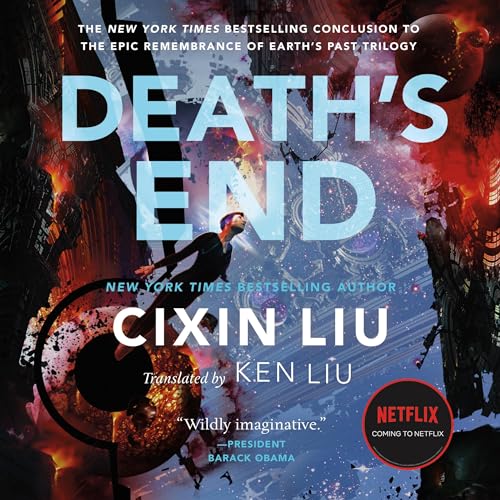Cixin Liu – Death’s End Audiobook
Cixin Liu – Death’s End (The Three-Body Problem #3) Audiobook

“Death’s End”: An Odyssey Through Time, Space, and the Human Spirit – A Comprehensive Review
In the realm of science fiction, few novels have the power to astound, captivate, and elucidate the cosmos’s enigmatic nature quite like Cixin Liu’s “Death’s End”. Serving as the concluding installment of the renowned Three-Body Problem trilogy, the novel not only meets the monumental expectations set by its predecessors but transcends them, launching readers into an uncharted narrative cosmos. The audiobook version, rendered with meticulous care and profound sensitivity, elevates this experience, allowing listeners to navigate Liu’s dense cosmological theories and complex characters with an engaging clarity.
The Narrative Cosmos Unbound
“Death’s End” weaves a tale spanning epochs, from the aftermath of the catastrophic Trisolaran invasion attempt to the distant twilight of the universe. Central to this odyssey is Cheng Xin, an aerospace engineer from the early 21st century, who, through a series of cosmic twists, becomes a pivotal figure in humanity’s quest for survival in an indifferent universe. Much like its protagonists, the story navigates a complex array of scientific possibilities, theoretical physics, and existential queries, never shying away from the grandiose or the speculative.
Audiobook: A Portal to Liu’s Universe
The audiobook version of “Death’s End” does more than just narrate; it immerses. The narration brings a depth and nuance to Liu’s expansive story, helping listeners to visualize the often abstract and complex scientific concepts central to the plot. Through skilled voice modulation and pacing, the audiobook captures the emotional gradients of the characters—from the depth of despair to the peaks of hope. Furthermore, the nuanced delivery of the scientific and philosophical discourses makes them accessible, ensuring that listeners are not just passive observers but active participants in unravelling the universe’s mysteries alongside Cheng Xin.
A Confluence of Science, Philosophy, and Art
What sets “Death’s End” apart is its audacious blend of hard science fiction with profound philosophical inquiries. Liu does not merely present a future shaped by technological advancements but questions the essence of humanity, civilization, and our place in the cosmos. This philosophical depth transfigures the novel from a mere narrative into a meditation on the future trajectory of sentient life. The audiobook rendition amplifies this introspective quality, giving the philosophical discourses a palpable presence, allowing listeners to engage with the material in a profoundly personal way.
The Canvas of Characters and Cultures
At the heart of “Death’s End” lies its rich tapestry of characters and the interstellar civilizations they encounter. Cheng Xin, with her complex blend of vulnerability and determination, emerges as a character that is profoundly relatable. The audiobook brings these characters to life with distinct voices and inflections, encapsulating their personalities, struggles, and growth. Listeners are granted an intimate glimpse into the psyche of these characters, transforming them from mere fictional creations into mirrors reflecting our fears, hopes, and the indomitable human spirit.
Conclusion: A Universally Resonating Tale
“Death’s End” is an epic narrative that spans the microcosm of human emotions to the macrocosm of cosmic existence. Its exploration of themes such as the persistence of love and the quest for knowledge in the face of oblivion resonates on a fundamentally human level. The audiobook version, with its stellar narration, not only elevates the storytelling but also makes the complex interweaving of science, philosophy, and human drama accessible to a broad audience.
In conclusion, “Death’s End” stands not just as a hallmark of science fiction but as a testament to the storytelling art. It challenges, entertains, and ultimately leaves us in awe of the boundless possibilities of both the universe and the narrative form itself. The audiobook doesn’t just narrate; it transforms words into a cosmic symphony, making “Death’s End” an essential listen for anyone drawn to the mysteries of the cosmos and the human condition.